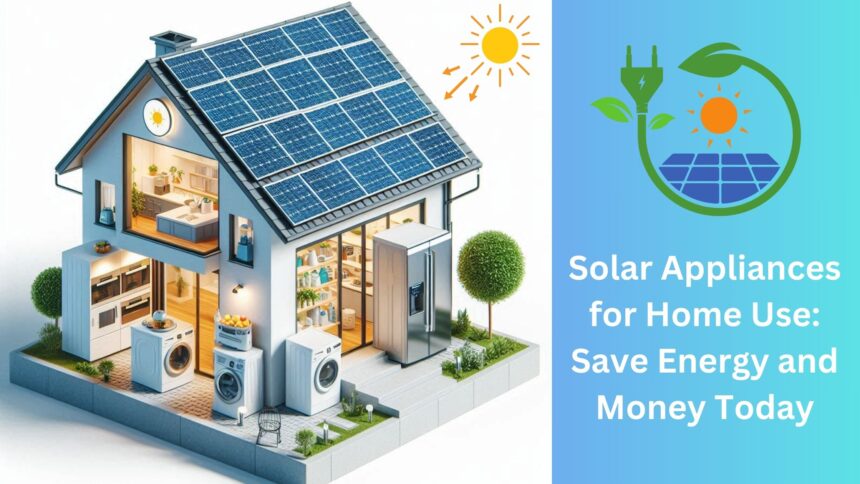Solar appliances for home are devices that use solar energy to function, converting sunlight into electricity through photovoltaic (PV) cells. These appliances include common household items like water heaters and lights, as well as specialized equipment such as refrigerators and air conditioners. These appliances offer a sustainable and cost-effective alternative to traditional electrical devices by incorporating solar technology.
Benefits of Solar Appliances
Cost Savings
Solar appliances can significantly reduce your electricity bills by utilizing free energy from the sun. Although there is an initial investment, the long-term savings on utility costs make it a worthwhile expenditure.
Environmental Impact
Using solar energy helps lower your carbon footprint, contributing to the fight against climate change. Solar appliances do not emit greenhouse gases during operation, making them an eco-friendly choice.
Energy Independence
Solar appliances provide independence in using energy, reducing your dependence on the grid. This is particularly beneficial in areas with unstable electricity supply or frequent power outages, ensuring a more reliable energy source.
Low Maintenance
Most solar appliances require minimal maintenance due to having fewer moving parts compared to conventional appliances. This results in lower maintenance costs and longer lifespans, making them a hassle-free option.
Popular Solar Appliances for Home
Solar Water Heaters

These heaters use solar panels to capture sunlight and convert it into heat, which is then used to warm water for household use.
Benefits:
- Cost Savings: by using free solar power you can reduce electricity bills.
- Eco-Friendly: Lowers carbon emissions by using renewable energy.
- Low Maintenance: Requires minimal upkeep compared to traditional water heaters.
Solar Lights
Solar lights are outdoor lighting solutions that charge during the day using solar panels and provide illumination at night.
Benefits:
- Easy Installation: wiring is not required, making them simple to set up.
- Energy Efficient: Operates on solar power, reducing electricity consumption.
- Versatile: Ideal for gardens, pathways, and security lighting.
Solar Refrigerators
These solar refrigerators use solar panels to power the cooling system, keeping food and beverages fresh without relying on the grid.
Benefits:
- Energy Independence: Perfect for off-grid living or areas with unreliable electricity.
- Cost Effective: Reduces electricity bills by using solar energy.
- Reliable: Provides consistent cooling even during a power interruption.
Solar Air Conditioners

Solar air conditioners use solar energy to cool your home, reducing the need for grid electricity.
Benefits:
- Lower Energy Costs: Significantly cuts down on electricity bills.
- Environmentally Friendly: Reduces greenhouse gas emissions.
- Efficient Cooling: Provides effective cooling while being energy-efficient.
Solar Ovens
Solar ovens use the sun’s energy to cook food, making them ideal for outdoor cooking and camping.
Benefits:
- No Fuel Required: Operates solely on solar energy, eliminating the need for gas or electricity.
- Portable: Easy to transport and set up, best for camping or outdoor activities.
- Eco-Friendly: Produces no emissions, making it a green cooking option.
Solar Powered Inverter
A solar-powered inverter transforms the direct current (DC) electricity produced by solar panels with the use of sunlight into alternating current (AC) electricity, which is used by most household appliances.
Benefits:
- Energy Efficiency: Optimizes the use of solar energy, reducing dependence on the grid.
- Cost Savings: you can reduce electricity bills by utilizing solar power.
- Eco-Friendly: Decreases carbon footprint by using solar energy.
Solar Cooker
A solar cooker harnesses the sun’s energy to cook food, providing an eco-friendly alternative to traditional cooking methods.
Benefits:
- No Fuel Required: Operates entirely on solar energy, eliminating the need for gas or electricity.
- Portable: Best for outdoor activities like camping and garden party.
- Safe and Clean: Produces no emissions, making it an environmentally friendly cooking option.
Floating Solar Powered Pool Lights
These lights float on the surface of the pool and are powered by solar energy, providing illumination without the need for electrical wiring.
Benefits:
- Easy Installation: No wiring is required, simply place them in the pool.
- Energy Efficient: Uses solar power, reducing electricity consumption.
- Elegant Look: Enhances the look of your pool with colourful lighting by solar-powered lights.
Hydroponic Solar Gardening System
This system combines hydroponic gardening with solar power, using solar panels to power the water pumps and grow lights needed for hydroponic plant growth.
Benefits:
- Sustainable Farming: Uses renewable energy to grow plants, reducing environmental impact.
- Water Efficiency: For Hydroponic systems, less water is required as compared to traditional soil-based gardening.
- Year-Round Growth: Provides optimal growing conditions regardless of external weather, ensuring continuous plant production.
How to Choose the Right Solar Appliances
Assessing Energy Needs
Begin by evaluating your household’s energy consumption. Identify which appliances are used most frequently and their energy requirements. This will help you determine which solar appliances will provide the most significant energy savings.
Budget Considerations
Solar appliances come in a range of prices. Establish a budget that fits your financial situation and seek appliances that offer the best value. While the initial cost may be higher, the long-term savings on energy bills can justify the investment.
Quality and Warranty
Opt for well-known brands that are recognized for their quality and reliability. Look for warranties and read customer reviews to ensure you’re purchasing durable and efficient products. The best warranty can offer peace of mind and protect your money.
Installation Requirements
Some solar appliances are straightforward to install on your own, while others may need professional installation. Consider the complexity of the installation process and whether you have access to qualified installers. Proper installation is necessary for the best performance of your solar appliances.
Installation and Maintenance Tips
Professional vs. DIY Installation
- Professional Installation: Hiring a professional ensures that your solar appliances are installed correctly and safely. Professionals have the expertise to handle complex installations, which can be crucial for appliances like solar water heaters and air conditioners. While this option might be more expensive, it can save you time and potential issues.
- DIY Installation: For simpler solar appliances like solar lights, DIY installation can be a cost-effective and straightforward option. Many of these appliances come with easy-to-follow instructions. However, ensure you have the necessary tools and a basic understanding of the installation process to avoid any problems.
Regular Maintenance Practices
- Cleaning Solar Panels: Dust and debris can reduce the efficiency of solar panels. Clean them regularly with water and a soft cloth or sponge. Avoid using harsh chemicals.
- Inspecting Connections: Regularly check the connections and wiring for any signs of wear or damage. Loose or damaged connections can affect the performance of your solar appliances.
- Battery Maintenance: If your solar appliances use batteries, ensure they are in good condition. Check for corrosion and replace batteries as needed to maintain optimal performance.
- Monitoring Performance: Keep an eye on the performance of your solar appliances. Many systems come with monitoring tools that can help you track energy production and identify any issues early.
Troubleshooting Common Issues
- Reduced Efficiency: If your solar appliances are not performing as expected, check for obstructions blocking sunlight, such as dirt on the panels or nearby trees casting shadows.
- Connection Problems: Loose or corroded connections can cause issues. Inspect and tighten connections as needed.
- Battery Issues: If your appliances use batteries, ensure they are charged and in good condition. Replace old or damaged batteries to restore performance.
- Inverter Problems: For appliances that use inverters, check the inverter for any error messages or indicators of malfunction. See the user manual or contact a professional if needed.
Customer Testimonials and Reviews
Real-life Experiences from Users
- John D.: “Switching to solar appliances has transformed our household. Our electricity bills have significantly decreased, and we feel good about reducing our carbon footprint. The solar water heater and lights were straightforward to install and have been working perfectly.”
- Priya S.: “Since last year, we have been using a Solar Refrigerator and Air Conditioner, and the results are amazing. Not only are we saving money, but we also have a reliable power source during frequent outages in our area. Highly recommend going solar!”
- Michael R.: “The solar oven is ideal for our camping trips. It’s portable, easy to use, and cooks food evenly without any fuel. It’s an excellent addition to our outdoor equipment.”
Ratings and Feedback
- Solar Water Heaters: ⭐⭐⭐⭐⭐
- “Efficient and reliable. Our water heating costs have dropped by 50%.”
- Solar Lights: ⭐⭐⭐⭐☆
- “Great for garden lighting. Easy to install and very bright.”
- Solar Refrigerators: ⭐⭐⭐⭐⭐
- “Perfect for off-grid living. Keeps everything cold even during power cuts.”
- Solar Air Conditioners: ⭐⭐⭐⭐☆
- “Effective cooling with minimal energy use. The installation was a bit tough, but it was absolutely worth it.”
- Solar Ovens: ⭐⭐⭐⭐⭐
- “Excellent for outdoor cooking. No need for gas or electricity, and it cooks food perfectly.”
Conclusion
Recap of Benefits
Switching to solar appliances provides numerous advantages:
- Cost Savings: Significantly lower your electricity bills by utilizing free solar energy.
- Environmental Impact: Reduce your carbon footprint and help create a greener planet.
- Energy Independence: Enjoy a reliable energy source, especially in areas with unstable electricity supply.
- Low Maintenance: Benefit from appliances that require minimal upkeep.
Transitioning to solar appliances is a wise decision for both your finances and the environment. With a variety of options available, you can find the perfect solar solutions to meet your needs and start reaping the benefits of renewable energy.





this website is excellent information and you are satisfied with it, it helps you alot thanks for the useful website
Great article. Thank you sharing it.